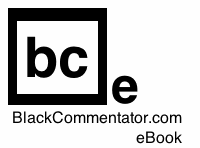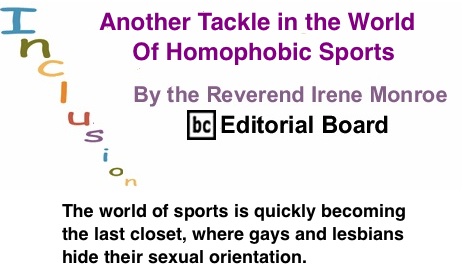




Another
former professional athlete came out last month - 6’, 7” Jamaican-born NFL
offensive tackle, Kwame Harris. With news of LGBT
equality in the news daily, one may wonder why this is news at all. But it is.
The world of sports is quickly becoming the last closet, where gays and
lesbians hide their sexual orientation. In a homophobic, testosterone-driven
sport such as American football, Harris’s concealment is understandable.
The African
American community desperately needs openly LGBT public role models. We need
them to come out and denounce anti-homophobic bullying, vitriol, and
discrimination. Very few role models have come from the
But sadly,
that list too is short, which is why I applaud Harris. It’s important to note
that, to date, no NFL player has come out while still in the game.
NFL Players Association president, Domonique Foxworth, thinks Harris’s coming out will encourage those players in the game to follow suit, but Seahawks defensive end, Chris Clemons, queries any future gay player’s motive for doing so.
“I’m not
against anyone but I think it’s [coming out] a selfish act. They just trying to
make themselves bigger than the team,” Clemons told Danny O’Neil of the
“That’s one
of the primary reasons no player has done it. Football players want to play
football, and they generally don’t want to create a distraction for themselves
or others on the team Even if teammates have no issue with a player being
honest about who he is, some teammates won’t understand why the player felt
compelled to grab a megaphone and let the world know private, personal
information that results in a microphone eventually being stuck in all their
faces,” Mike Floro posted on NBC Sports blog “Pro
Football Talk.”
The only way
to allow LGBTQ athletes to openly engage in their sport of choice is to purge
homophobic stereotypes from its milieu. But not all sports are open to it.
Harris said
one of the reasons for staying in the closet about his sexual orientation was because
both his college and professional environments made it impossible to come out
without derailing his career.
Harris told AP his “mind went to ‘dark places at
times’ as he struggled with (his) secret identity” because “
being gay and being a professional football player in the NFL were
incompatible.”
Harris knows
that homophobia espoused by African American sports professionals such as
Clemons is shaped by a particular type of black masculinity that no longer has
to break through this country’s color barrier to represent the race and prove
athletic prowess or manhood in sports.
It is now a
black hyper-masculinity and urban aesthetic shaped by hip-hop culture and
“video-mercials” that not only exploit women, but
also unabashedly denigrate and go after lesbian, gay, bisexual, transgender and
queer people. And they care little about its deleterious effects on all
children - straight and gay.
The
aggressive posturing and repudiation of LGBTQ people allows these athletes to
feel safe in the locker room by maintaining the myth that all the guys gathered
on their team are heterosexual, and sexual attraction among them just does not
exist.
This myth
allows homophobic teammates to enjoy the homo-social setting of the male locker
room that creates male-bonding - and the physical and emotional intimacy that
goes on among them. The homo-erotic slaps on the buttocks, hugging, and kissing
on the cheek that happen on the field and locker room would be labeled gay
anywhere else. LGBTQ professional athletes must constantly monitor how they are
being perceived by teammates, coaches, and endorsers to avoid suspicion. They
are expected to maintain a public silence so that their identity does not
tarnish the rest of the team.
Whenever
discrimination is the culprit for barring great athletes from competing openly,
it is not only the athletes who miss out, but so, too, the world.
For example,
male synchronized swimmers, unfortunately, are still barred from competing in
the Olympics. A month before the London 2012 Olympic Games began, Out To Swim,
Britain’s gay male synchro team, wrote a letter to
the International Olympic Committee and FINA, the international federation
governing body of swimming, contesting that males deserve to compete in
synchronized swimming, and their discriminatory rules need to be changed in
time for the 2016 games in Rio de Janeiro.
I could have
never imaged an openly gay professional boxer. Then I found Orlando Cruz.
Cruz is not
only fierce in the ring but he is also fierce for having the courage to come
out. As an old bastion of heterosexual masculinity, Cruz as well as today’s
female boxers, are breaking down walls and dispelling stereotypes. While
Orlando Cruz is not the only gay professional boxer in the history of the sport,
he is, however, the first to make it public.
In Oct. 2012,
this 31-year-old Puerto Rican featherweight was revving up to challenge Mexican
boxer Jorge Pazos for the World Boxing Organization’s
(WBO) Latino title. Cruz had more than a good chance at it. He won. And was the
first to knock out a stereotype.
Harris is
doing the same.

BlackCommentator.com Editorial Board member and Columnist, the Rev. Irene Monroe, is a religion columnist, theologian, and public speaker. She is the Coordinator of the African-American Roundtable of the Center for Lesbian and Gay Studies in Religion and Ministry (CLGS) at the Pacific School of Religion. A native of Brooklyn, Rev. Monroe is a graduate from Wellesley College and Union Theological Seminary at Columbia University, and served as a pastor at an African-American church before coming to Harvard Divinity School for her doctorate as a Ford Fellow. She was recently named to MSNBC’s list of 10 Black Women You Should Know. Reverend Monroe is the author of Let Your Light Shine Like a Rainbow Always: Meditations on Bible Prayers for Not’So’Everyday Moments. As an African-American feminist theologian, she speaks for a sector of society that is frequently invisible. Her website is irenemonroe.com. Click here to contact the Rev. Monroe.





